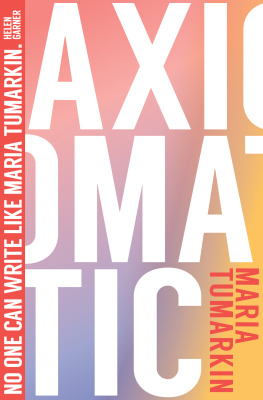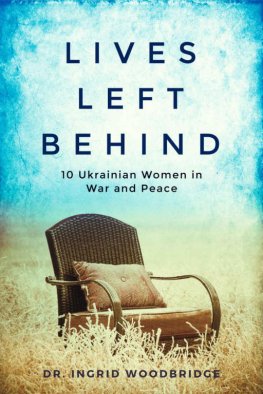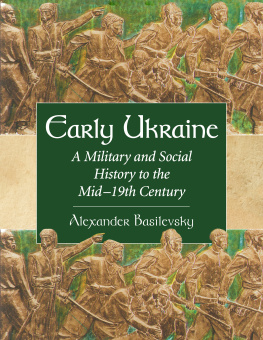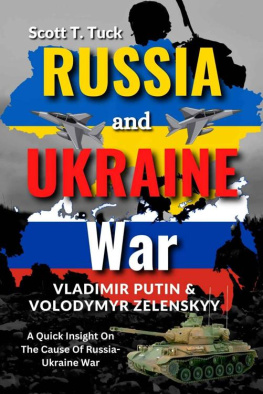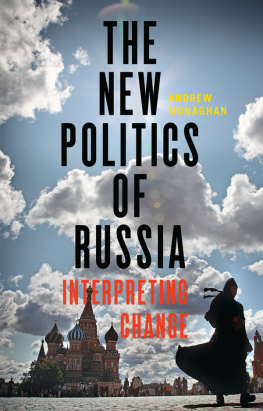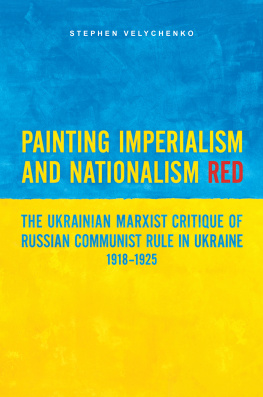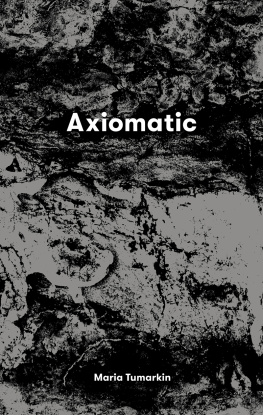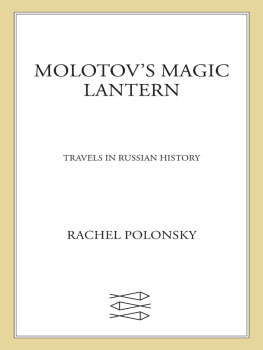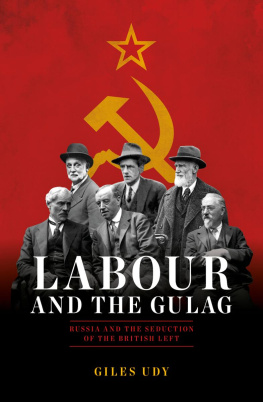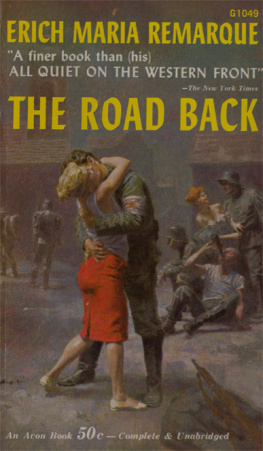All rights reserved. No part of this book may be reproduced or transmitted by any person or entity, including internet search engines or retailers, in any form or by any means, electronic or mechanical, including printing, photocopying (except under the statutory exceptions provisions of the Australian Copyright Act 1968), recording, scanning or by any information storage and retrieval system without the prior written permission of Random House Australia. Any unauthorised distribution or use of this text may be a direct infringement of the author's and publisher's rights and those responsible may be liable in law accordingly.
Otherland
ePub ISBN 9781864715880
Kindle ISBN 9781864717587
A Vintage book
Published by Random House Australia Pty Ltd
Level 3, 100 Pacific Highway, North Sydney NSW 2060
www.randomhouse.com.au
First published by Vintage in 2010
Copyright Maria Tumarkin 2010
The moral right of the author has been asserted.
All rights reserved. No part of this book may be reproduced or transmitted by any person or entity, including internet search engines or retailers, in any form or by any means, electronic or mechanical, including photocopying (except under the statutory exceptions provisions of the Australian Copyright Act 1968), recording, scanning or by any information storage and retrieval system without the prior written permission of Random House Australia.
Every effort has been made to acknowledge and contact the copyright holders for permission to reproduce material contained in this book. Any copyright holders who have been inadvertently omitted from the acknowledgements and credits should contact the publisher and omissions will be rectified in subsequent editions.
Addresses for companies within the Random House Group can be found at www.randomhouse.com.au/offices
National Library of Australia
Cataloguing-in-Publication Entry
Tumarkin, Maria.
Otherland / Maria Tumarkin.
ISBN: 978 1 74166 679 3 (pbk.)
Tumarkin, Maria.
Tumarkin, Svetlana.
Tumarkin, Billie.
Russians Australia Biography.
Russian Australians Biography.
Immigrants Australia Biography.
Mothers and daughters Australia Biography.
Vacations Russia Biography.
Cover design by Christabella Designs
Internal design and typesetting by Post Pre-press Group
10 9 8 7 6 5 4 3 2 1
PROLOGUE
IT IS ON THE train from Russia to Ukraine that the moment I have been waiting for finally comes, and Billie refuses to use the toilet, point-blank. She will hold on, she says: she was not born a woman for nothing. The problem, I discover, is not the soggy brown rug thrown over a hole in the toilet's floor, but something that inhabits a hole in the toilet's wall something my daughter, with the full force of her adolescent pessimism, has immediately classified as a used sanitary pad. And so she goes on strike, inconsolable in her revulsion.
'You have not travelled,' I tell Billie, 'unless you have seriously considered just how far you are prepared to go to keep your bladder from bursting. This is the real journey every semidecent traveller must take.' We are going from my favourite city in the world, St Petersburg, the 'Venice of the North', to my mother's hometown, Kiev, or the 'Jewel of the East', as those shameless, pimping guidebooks would tell you.
And the toilets are a trade-off for the way simple black tea tastes on the overnight trains, for the stories that fall out of people at this meeting place of intimacy and total anonymity; and for the special kind of sleep, not found anywhere else, when your body is floating, weightless, in the thick of the train's forward movement. As one habituated insomniac to another, I show Billie that special flavour of train sleep as if it were one of the Seven Wonders of the World.
I would gladly claim as my own country the weary trees, the tightly stretched sky, the numbered light poles outside our window, except that in my years of absence this place has undergone an extreme make-over. It has divided like some monstrous parent cell into a myriad daughter cells, each with its own currency, its own petty tsar swaying an iron fist, its own intractable visa entry requirements. 'This is where your family comes from,' I tell Billie, swallowing countless disclaimers and footnotes. I make it sound plain as plain, desperate not to overdo it, to keep the theatre out of the moment. 'This is it, Billie, the Point A, the mother of all destinations.'
I try to imagine what she sees and whether her eyes get fogged up by all the slimy grey colours, the piles of rubbish, the ribs sticking out from the surprisingly sprightly cows and horses we pass by that first all-deceiving layer that in any unkempt place makes you feel like you know exactly where you are yet tells you absolutely nothing. 'So you are going to write about how everything is dirty and falling apart,' my second cousin in Dnepropetrovsk says a few weeks later. There is sadness in her eyes, not contempt. 'Look at our roads,' she says, 'our public transport, our buildings, our women in their war paint and impossible heels. God, I can only imagine what you must be thinking.' But I am not thinking what you think I am thinking, my dear cousin. I am not here to write a coy, sympathetic account of the freak show that was once my home. Frankly, I don't think the world needs another book about how everything is dirty and falling apart somewhere else; or even another book about the sort of somewhere else where everything is idyllic.
Dubravka Ugreic, a Croatian-born writer I admire greatly for the way she can unpick the stupidity and spin of hyper-nationalism, says that after the Berlin Wall came down the Western literary market was flooded with all kinds of books in which the writers regaled readers with clichd images of post-Communist Eastern Europe: pre-Industrial-era public toilets; waiters dripping with contempt for their customers; crumbling exteriors and inebriated masses; the triumph of jingoism; oh, and not forgetting, locals 'who ate dog food instead of steak'. 'The authors of these works managed to find the pressure points in the imagination of the Western reader,' Ugreic says.
So, no, although this book begins in a rather disgraceful Russian toilet it is, I sincerely hope, not one of those books. It is certainly not an exercise in revealing and revelling in the former Empire's underbelly I am no expat on a mission. My motives are altogether different if not entirely clear, even to myself. There is, first and foremost, the urge Billie and I share to connect her viscerally to her family's history, to set that history going again to get its blood pumping and its joints moving, make its connective tissues elastic but firm. There is also my own self-serving desire to come back to people and places still powerfully alive that speak to me daily despite (or perhaps because of ) the years and kilometres separating us.
Last but not least, if I call myself a writer, then this book seems to me a literary bridge that I must inevitably cross. The journey home is, of course, an archetypal narrative, and I am sure you know that it has been done to death. Me too: I spent months being scared of making this trip and, at the end of it, having nothing of any value or originality to say. But one thing you learn from travelling is that it is far scarier to think about than to do. In the end, it can only make sense if you give up the worry and throw yourself in at the deep end, not necessarily with gay abandon, but with something perhaps more akin to fatalistic wonderment how else do you get anywhere, really?
On this train taking us from Russia to Ukraine across a border that did not exist when my parents and I still lived here, and that feels, perhaps ominously, like a plaything to me, like one of those little bridges that go over the railway tracks in a model train set, we throw ourselves into our diaries. Billie's diary is a hard, green notebook with a floating love heart and a few leaves stuck midair on its cover. Mine is a soft, yellow Spirax with four note pockets and no visible adornments. Billie starts her every entry with the conventional 'Dear Diary'. I only note a day and a place, addressing no one. My sentences are incomplete, cryptic and dry. Hers are winding, lyrical, thickly coated in drama and sarcasm:



